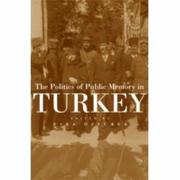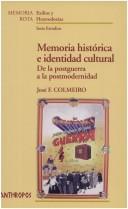| Listing 1 - 10 of 72 | << page >> |
Sort by
|

ISBN: 9780815631316 0815631316 Year: 2007 Publisher: Syracuse, N.Y. Syracuse University Press
Abstract | Keywords | Export | Availability | Bookmark
 Loading...
Loading...Choose an application
- Reference Manager
- EndNote
- RefWorks (Direct export to RefWorks)
Collective memory --- Turkey --- History. --- History as a science --- Sociology of culture --- Collective remembrance --- Common memory --- Cultural memory --- Emblematic memory --- Historical memory --- National memory --- Public memory --- Social memory --- Memory --- Social psychology --- Group identity --- National characteristics
Book
ISBN: 9781781380963 9781781385623 9781846319761 1781380961 1781385629 1846319765 1846319765 Year: 2013 Publisher: Liverpool Liverpool University Press
Abstract | Keywords | Export | Availability | Bookmark
 Loading...
Loading...Choose an application
- Reference Manager
- EndNote
- RefWorks (Direct export to RefWorks)
This work reconsiders debates about historical memory from the perspective of the theory of emotions. Its main claim is that the demise of the Spanish empire in 1898 spurred a number of contradictory emotional responses, ranging from mourning and melancholia to indignation, pride, and shame. It shows how intellectuals sought to reimagine a post-Empire Spain by drawing on myth and employing a predominantly emotional register.
Collective memory --- Collective remembrance --- Common memory --- Cultural memory --- Emblematic memory --- Historical memory --- National memory --- Public memory --- Social memory --- Memory --- Social psychology --- Group identity --- National characteristics --- Spain --- History --- History of Spain --- anno 1800-1999 --- Spanish literature --- History and criticism.

ISBN: 9781592131402 9781592131419 1592131409 1592131417 Year: 2008 Publisher: Philadelphia, Pa Temple University Press
Abstract | Keywords | Export | Availability | Bookmark
 Loading...
Loading...Choose an application
- Reference Manager
- EndNote
- RefWorks (Direct export to RefWorks)
History as a science --- Oral history. --- Collective memory. --- Histoire orale --- Mémoire collective --- Oral history --- Collective memory --- Mémoire collective --- History --- Oral biography --- Oral tradition --- Collective remembrance --- Common memory --- Cultural memory --- Emblematic memory --- Historical memory --- National memory --- Public memory --- Social memory --- Memory --- Social psychology --- Group identity --- National characteristics --- Methodology

ISBN: 9781845452841 1845452844 Year: 2007 Volume: 3 Publisher: New York, N.Y. Berghahn
Abstract | Keywords | Export | Availability | Bookmark
 Loading...
Loading...Choose an application
- Reference Manager
- EndNote
- RefWorks (Direct export to RefWorks)
"Despite the growing interest in general European history, the European dimension is surprisingly absent from the writing of contemporary history. In most countries, the historiography on the 20th century continues to be dominated by national perspectives. Although there is cross-national work on specific topics such as occupation or resistance, transnational conceptions and narratives of contemporary European history have yet to be worked out. This volume focuses on the development of a shared conception of recent European history that will be required as an underpinning for further economic and political integration so as to make lasting cooperation on the old continent possible. It tries to overcome the traditional national framing that ironically persists just at a time when organized efforts to transform Europe from an object of debate to an actual subject have some chance of succeeding in making it into a polity in its own right."
History --- European cooperation --- Collective memory --- Philosophy --- Europe --- History of Europe --- anno 1900-1999 --- Collective remembrance --- Common memory --- Cultural memory --- Emblematic memory --- Historical memory --- National memory --- Public memory --- Social memory --- Memory --- Social psychology --- Group identity --- National characteristics --- Council of Europe countries --- Eastern Hemisphere --- Eurasia --- History - Philosophy - Congresses --- European cooperation - Congresses --- Collective memory - Europe - Congresses --- Europe - History - 20th century - Congresses

ISBN: 9788476587331 8476587333 Year: 2005 Publisher: Rubí, Barcelona Anthropos
Abstract | Keywords | Export | Availability | Bookmark
 Loading...
Loading...Choose an application
- Reference Manager
- EndNote
- RefWorks (Direct export to RefWorks)
Uno de los grandes temas de nuestro tiempo es la relación entre la memoria histórica y el olvido, y su papel en la construcción de la identidad cultural en la España contemporánea. Desde la tradición interdisciplinaria de los estudi os culturales, el autor ofrece un panorama crítico de los usos y abusos de la memoria, rastreando una variedad de textos, documentales, películas,... que han configurado la cultura española desde la guerra civil hasta nuestros días.
946.09 --- Geschiedenis van Spanje: koninkrijk--(1975-heden) --- 946.09 Geschiedenis van Spanje: koninkrijk--(1975-heden) --- History of Spain --- anno 1900-1999 --- Collective memory --- National characteristics, Spanish --- Collective remembrance --- Common memory --- Cultural memory --- Emblematic memory --- Historical memory --- National memory --- Public memory --- Social memory --- Memory --- Social psychology --- Group identity --- National characteristics --- Spanish national characteristics --- Spain --- History
Book
ISBN: 1501705636 0801460336 9780801460333 9780801449444 0801449448 Year: 2010 Publisher: Ithaca, N.Y. Cornell University Press
Abstract | Keywords | Export | Availability | Bookmark
 Loading...
Loading...Choose an application
- Reference Manager
- EndNote
- RefWorks (Direct export to RefWorks)
In Aversion and Erasure, Carolyn J. Dean offers a bold account of how the Holocaust's status as humanity's most terrible example of evil has shaped contemporary discourses about victims in the West. Popular and scholarly attention to the Holocaust has led some observers to conclude that a "surfeit of Jewish memory" is obscuring the suffering of other peoples. Dean explores the pervasive idea that suffering and trauma in the United States and Western Europe have become central to identity, with victims competing for recognition by displaying their collective wounds.She argues that this notion has never been examined systematically even though it now possesses the force of self-evidence. It developed in nascent form after World War II, when the near-annihilation of European Jewry began to transform patriotic mourning into a slogan of "Never Again": as the Holocaust demonstrated, all people might become victims because of their ethnicity, race, gender, or sexuality-because of who they are.The recent concept that suffering is central to identity and that Jewish suffering under Nazism is iconic of modern evil has dominated public discourse since the 1980s.Dean argues that we believe that the rational contestation of grievances in democratic societies is being replaced by the proclamation of injury and the desire to be a victim. Such dramatic and yet culturally powerful assertions, however, cast suspicion on victims and define their credibility in new ways that require analysis. Dean's latest book summons anyone concerned with human rights to recognize the impact of cultural ideals of "deserving" and "undeserving" victims on those who have suffered.
Collective memory. --- Victims. --- Holocaust, Jewish (1939-1945) --- Collective remembrance --- Common memory --- Cultural memory --- Emblematic memory --- Historical memory --- National memory --- Public memory --- Social memory --- Memory --- Social psychology --- Group identity --- National characteristics --- Persons --- Influence. --- Moral and ethical aspects. --- General ethics --- Jewish religion --- anno 1940-1949
Book
ISBN: 9781845456528 Year: 2010 Publisher: New York, N.Y. Berghahn
Abstract | Keywords | Export | Availability | Bookmark
 Loading...
Loading...Choose an application
- Reference Manager
- EndNote
- RefWorks (Direct export to RefWorks)
History as a science --- History of Africa --- Collective memory --- Historiography --- Memory --- Retention (Psychology) --- Intellect --- Psychology --- Thought and thinking --- Comprehension --- Executive functions (Neuropsychology) --- Mnemonics --- Perseveration (Psychology) --- Reproduction (Psychology) --- Historical criticism --- History --- Authorship --- Collective remembrance --- Common memory --- Cultural memory --- Emblematic memory --- Historical memory --- National memory --- Public memory --- Social memory --- Social psychology --- Group identity --- National characteristics --- Social aspects --- Criticism --- Africa --- Historiography.
Book
ISBN: 9789004522145 9789004525207 Year: 2023 Publisher: Leiden Brill
Abstract | Keywords | Export | Availability | Bookmark
 Loading...
Loading...Choose an application
- Reference Manager
- EndNote
- RefWorks (Direct export to RefWorks)
Known for its breathtaking scenery, the central-east African country of Rwanda lived through one of the worst episodes of violence of the late 20th century, the 1994 Genocide against the Tutsi, in which over a million people were brutally murdered in 100 days.This book recounts the personal story of Claver Irakoze who survived the genocide as an eleven-year-old child and, like other Rwandans of his generation, is now grappling with the heavy responsibility of raising children in the post-genocide context.Tracing the various stages of Irakoze's life experiences, each chapter teases out issues surrounding childhood, parenting and the transmission of memories between generations. The final chapter draws on Irakoze's personal and professional experience to provide some reflections on managing memories of genocide within the family.
Genocide survivors --- Rwandan Genocide, Rwanda, 1994. --- Children and genocide --- Collective memory --- Parenting --- Identity (Philosophical concept) --- Irakoze, Claver, --- Rwanda --- History --- Children. --- Survivors, Genocide --- Victims --- Collective remembrance --- Common memory --- Cultural memory --- Emblematic memory --- Historical memory --- National memory --- Public memory --- Social memory --- Memory --- Social psychology --- Group identity --- National characteristics --- Genocide and children --- Genocide --- Sociology of culture --- National movements --- anno 1990-1999
Book
ISBN: 1613768907 9781625346148 9781613768914 9781613768907 9781625346155 1613768915 Year: 2022 Publisher: Amherst, Mass. University of Massachusetts Press
Abstract | Keywords | Export | Availability | Bookmark
 Loading...
Loading...Choose an application
- Reference Manager
- EndNote
- RefWorks (Direct export to RefWorks)
"The Venice Ghetto was founded in 1516 by the Venetian government as a segregated area of the city in which Jews were compelled to live. The world's first ghetto and the origin of the English word, the term simultaneously works to mark specific places and their histories, and as a global symbol that evokes themes of identity, exile, marginalization, and segregation. To capture these multiple meanings, the editors of this volume conceptualize the ghetto as a "memory space that travels" through both time and space. This interdisciplinary collection engages with questions about the history, conditions, and lived experience of the Venice Ghetto, including its legacy as a compulsory, segregated, and enclosed space. Contributors also consider the ghetto's influence on the figure of the Renaissance moneylender, the material culture of the ghetto archive, the urban form of North Africa's mellah and hara, and the ghetto's impact on the writings of Primo Levi and Marjorie Agosín. In addition to the volume editors, The Venice Ghetto features a foreword from James E. Young and contributions from Shaul Bassi, Murray Baumgarten, Margaux Fitoussi, Dario Miccoli, Andrea Yaakov Lattes, Federica Ruspio, Michael Shapiro, Clive Sinclair, and Emanuela Trevisan Semi"--
Jews --- Jewish ghettos. --- Collective memory. --- Collective memory --- Jewish ghettos --- Ghettos, Jewish --- Cities and towns --- Hebrews --- Israelites --- Jewish people --- Jewry --- Judaic people --- Judaists --- Ethnology --- Religious adherents --- Semites --- Judaism --- Collective remembrance --- Common memory --- Cultural memory --- Emblematic memory --- Historical memory --- National memory --- Public memory --- Social memory --- Memory --- Social psychology --- Group identity --- National characteristics --- Antisemitism --- Segregation --- Segregation. --- History. --- Venice (Italy) --- History of Italy --- anno 1500-1599 --- Venice
Book
ISBN: 9780367150761 036715076X 9780367150754 0367150751 9780429054846 Year: 2020 Publisher: London Routledge, Taylor & Francis Group
Abstract | Keywords | Export | Availability | Bookmark
 Loading...
Loading...Choose an application
- Reference Manager
- EndNote
- RefWorks (Direct export to RefWorks)
"This stimulating volume explores how the memory of the Reformation has been remembered, forgotten, contested, and reinvented between the sixteenth and twenty-first centuries. Remembering the Reformation traces how a complex, protracted and unpredictable process came to be perceived, recorded, and commemorated as a transformative event. From local to global patterns of memory, the contributors examine the ways in which the Reformation embedded itself in the historical imagination and analyse the enduring, unstable and divided legacies that it engendered. The book also underlines how modern scholarship is indebted to processes of memory-making initiated in the early modern period and challenges the conventional models of periodization that the Reformation itself helped to create. This collection of essays offers an expansive examination and theoretically engaged discussion of concepts and practices of memory and Reformation. This volume is ideal for upper level undergraduates and postgraduates studying the Reformation, Early Modern Religious History, Early Modern European History, and Early Modern Literature"--
Reformation --- Protestantism --- Church history --- Collective memory --- Collective remembrance --- Common memory --- Cultural memory --- Emblematic memory --- Historical memory --- National memory --- Public memory --- Social memory --- Memory --- Social psychology --- Group identity --- National characteristics --- Christianity --- Ecclesiastical history --- History, Church --- History, Ecclesiastical --- History --- Protestant churches --- Protestant Reformation --- Counter-Reformation --- Historiography --- Christian church history --- anno 1500-1799 --- anno 1800-1999
| Listing 1 - 10 of 72 | << page >> |
Sort by
|

 Search
Search Feedback
Feedback About UniCat
About UniCat  Help
Help News
News